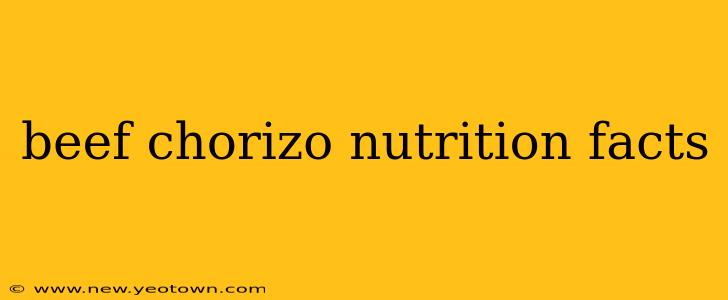Let's face it, beef chorizo is delicious. That rich, smoky flavor, the satisfying snap when you bite into it… it's hard to resist. But before you load up your next plate, let's take a closer look at the beef chorizo nutrition facts. Understanding its nutritional profile will help you enjoy this flavorful ingredient responsibly and as part of a balanced diet. This isn't just about calories; we'll explore the good, the bad, and the spicy in this hearty sausage.
What are the Macronutrients in Beef Chorizo?
The macronutrient breakdown of beef chorizo varies depending on the brand and preparation method. However, a typical serving (approximately 1 ounce or 28 grams) generally contains:
- Calories: Around 80-120 calories. This can fluctuate significantly based on fat content. Leaner varieties will have fewer calories.
- Fat: This is where things get interesting. Beef chorizo is typically higher in fat than other sausages, often ranging from 7-15 grams per ounce. Much of this is saturated fat, which should be consumed in moderation.
- Protein: Beef chorizo is a decent source of protein, usually providing around 6-8 grams per ounce. This contributes to satiety and muscle building.
- Carbohydrates: Surprisingly low, usually under 1 gram per serving. This is largely due to the absence of added sugars and significant carbohydrate sources in the primary ingredients.
How Much Sodium is in Beef Chorizo?
This is a crucial aspect of beef chorizo nutrition. Because of the curing and flavoring processes, beef chorizo often contains a significant amount of sodium. A single ounce can easily contain 200-400 milligrams of sodium, a substantial portion of the recommended daily intake. Individuals watching their sodium intake due to high blood pressure or other health concerns should be mindful of this.
Is Beef Chorizo High in Cholesterol?
Yes, beef chorizo tends to be higher in cholesterol compared to other meats. The cholesterol content varies between brands, but it's safe to say that it's a consideration for those watching their cholesterol levels. Like sodium, moderation is key.
What are the Vitamins and Minerals in Beef Chorizo?
While not a powerhouse of vitamins and minerals, beef chorizo does offer some nutritional benefits. It contains small amounts of:
- Iron: Important for red blood cell production.
- B Vitamins: Especially B12, crucial for nerve function and red blood cell formation.
- Zinc: Supports immune function and wound healing.
Is Beef Chorizo Gluten-Free?
Generally, yes, beef chorizo is gluten-free provided it doesn't contain any added gluten-containing ingredients. Always check the ingredient label to be certain.
How Can I Make Beef Chorizo Healthier?
You can improve the nutritional profile of beef chorizo by:
- Choosing leaner varieties: Opt for brands that emphasize lean beef and lower fat content.
- Portion control: Be mindful of your serving size.
- Balancing your meals: Incorporate plenty of fruits, vegetables, and whole grains to create a well-rounded diet.
- Making your own: If you’re feeling adventurous, making your own chorizo gives you complete control over the ingredients and fat content.
What are the potential health risks of eating beef chorizo?
Due to its high fat, sodium, and cholesterol content, consuming too much beef chorizo can increase your risk of heart disease, high blood pressure, and high cholesterol. Moderation is key, and a balanced diet is crucial to mitigate these risks.
Remember, enjoying food is part of a balanced lifestyle. With awareness of the nutritional profile and conscious choices about portion size and frequency of consumption, you can continue to enjoy the delicious flavor of beef chorizo without compromising your health.

